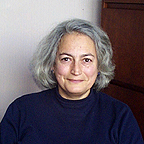PROBLEM-SOLVING PORTAL FOR NCI POSTDOCS
 |
|
Donna
Vogel
|
There’s a new doorway in Building 31 through which NCI’s hundreds of postdocs are invited to pass—either on the ground or in cyberspace—to find answers to the large and small dilemmas that may arise in the normal course of life here.
Donna Vogel, the first director of NCI’s newly established Fellowship Office, is on the other side of that door—ready to help postdocs remove obstructions from their path to an exciting and useful postdoctoral experience at NIH.
Those obstructions can be personal, such as not having adequate childcare, or professional, such as feeling tethered to one’s PI. The NCI Fellowship Office is viewed as a central portal to solutions to the diverse problems that can beset an NCI fellow and also, perhaps, as a prototype office for any NIH institute exploring ways to improve the lot of its research trainees.
"What was missing," Vogel said, recounting the evolution of the idea for the office—which originated in the deliberations in 1997 of the NCI Intramural Advisory Board—"was an office that exists solely to serve the needs of the fellows. A place that, first of all, could diagnose what those needs were and also diagnose the needs of the PIs vis-à-vis working with their post-docs. It was not just about getting postdocs here, but keeping them once they got here."
That a scientist was courted to head the office reflects the emphasis placed on enhancing the research environment for NCI fellows, observed Vogel, who came to NIH 20 years ago as an inter-institute endocrinology fellow and has been based at NICHD as a researcher and officer ever since her arrival. She officially assumed the position of director of the NCI Fellowship Office in January 2001, but she also continues as an adjunct scientist in the NICHD Developmental Endocrinology Branch.
Vogel’s initial plan of action in a "place as huge as NCI" is to "get into the trenches [and] meet with small lab groups" to help the people there find like-minded individuals in other NCI regions with whom to collaborate or simply communicate. Almost instantly, she started taking field trips—visiting labs in Frederick, going on a research retreat with the NCI Laboratory of Pathology.
"I’m very interested in connecting the campuses (Bethesda, Frederick, Gaithersburg)—in building bridges" among people nominally based in different fields within the NCI community but sharing an interest in such pursuits as immunology, developmental biology, or basic biology, for instance. Postdocs, she said, ought not exist "in isolation, chained to a bench and a computer, with a taskmaster above telling them to ‘produce results!’ [They] need to be seen not as an isolated point in space and time but as part of a career trajectory that is building our next generation of scientists."
Indeed, she said, part of the "results" of any given lab is producing scientists, and scientists not only do research in the lab, they present research at meetings, they teach younger students, they develop business and writing skills—all legitimate activities away from the bench.
Vogel intends to develop IRP workshops tailored to the NCI population that will complement Office of Education survival skills and career seminars and "smooth the transition" out of NIH with training in how to find and secure a compatible job.
She hopes to conduct exit interviews with each outgoing postdoc to measure the success of the Fellowship Office in identifying and solving problems. "What were your problems, how were they resolved, were we helpful, did the fellowship meet your expectations, what did you like, where are you going now–these are the kinds of questions we want to ask each person before they leave." And the message she wants to convey to each postdoc right now is "do not hesitate to get in touch with us." The Fellowship Office web site has links to all its NIH partners—personal service organizations, research resources, and professional training opportunities.
The NCI Fellowship Office is in Building 31, Room 3A44. Vogel can be contacted by e-mail, as can special assistant Viola Black; the phone number is 496-4796; fax 496-0826.